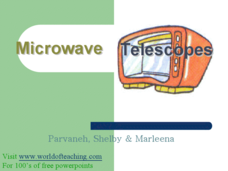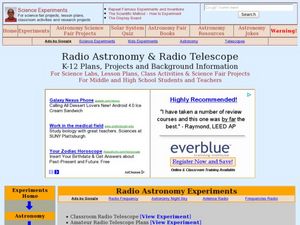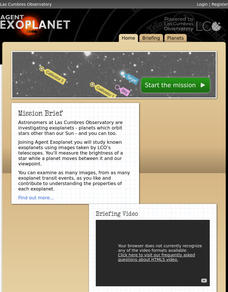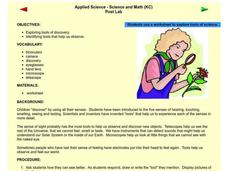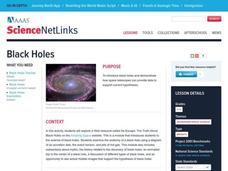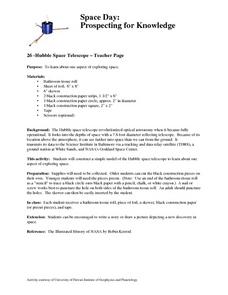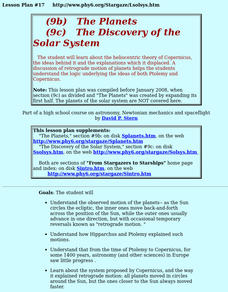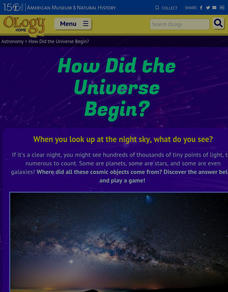Curated OER
Microwave Telescopes
Discovery of microwaves and other trivia starting this PowerPoint will help interest your class in the application and behavior of these radio waves. Great images to show real-life experiments and equipment help understanding of how the...
Curated OER
Sky Watching
Learners explain how our knowledge of the sky has been enhanced by telescopes. They make their own night-sky observations, diagram and describe what they see, and examine pictures taken by telescopes.
Curated OER
Hubble Space Telescope Webquest
Middle schoolers research the Hubble Space Telescope. In this Hubble Space Telescope instructional activity, students complete a webquest about the Hubble Space Telescope.
Curated OER
Radio Astronomy and Radio Telescope
Students construct a simple radio telescope. For this astronomy lesson, students explain how this telescope works and what information it collects.
Curated OER
Sky Watching
Students complete night-sky observations to understand how our knowledge of the sky has been enhanced by telescopes. Students complete a timeline worksheet giving the history of telescopes. Students then then make their own observations...
Las Cumbres Observatory
Agent Exoplanet
Not everything revolves around the sun! Believe it or not, there are planets, called exoplanets, that orbit stars other than our sun. Learners use an interactive online resource to research several of these planets. They learn about the...
Curated OER
Scavenger Hunt: Who am I?
In this space science worksheet, learners use the sites listed on the Solar System and Planets page of the Kid Zone to locate the names of the people credited with each discovery. They identify and name 26 different scientists who made...
Curated OER
Applied Science - Science and Math Post-Lab
Learners use scientific tools. In this Applied Science lesson, students investigate the use of scientific tools to enhance observation and discovery. Learners indicate how each tool assists scientific work.
Curated OER
Sky Watching
Middle schoolers examine telescopes and understand how they have helped us better understand the sky. In this astronomy instructional activity students complete a worksheet and a lab activity.
Curated OER
Telescopes Then And Now
In this telescopes worksheet, students will read information about the differences between the early telescopes and the modern telescopes. Then students will complete 2 short answer questions.
NASA
Blinded by the Light!
Pupils learn of multiple ways astronomers look for planets outside of the solar system. By completing a hands-on activity, scholars discover that trying to see the planets directly because of the glare from the nearby star is nearly...
Curated OER
Black Holes
Students study black holes and see how space telescopes can provide data to support current hypotheses. They examine the anatomy of a black hole using a diagram of an accretion disk, the event horizon, and jets of hot gas.
Curated OER
Light - Stop Faking It!
This well-designed presentation covers many important aspects of the science behind light. In it, pupils view slides that have a lot of the important vocabulary associated with science, slides of famous scientists who made important...
PBS
Exoplanets through Kepler’s Laws
The majority of all confirmed exoplanets relied on Kepler's laws to discover their locations. Scholars learn how to apply Kepler's laws and then practice using data to discover exoplanets. They benefit from NASA video footage, NOVA...
Curated OER
Islamic Scientific Contributions to Civilization
Seventh graders explore several well documented artistic and scientific accomplishments that were discovered or perfected during The Golden Age of Islam. They are staff writers of a magazine who create a feature article about a topic...
NASA
Space Images
As technology advances, so does our understanding of the universe around us. Thanks to the Hubble Telescope, Mars rovers, and other high-resolution cameras, there are amazing photographs of celestial bodies, planets, comets, and more...
Curated OER
Spacd Day:Probing For Knowledge
Students investigate the uses and purpose of the Hubble telescope. They create a model of the telescope and conduct research about the history behind the invention of it. Students use the information in order to create a context for the...
Curated OER
Detecting Meteors by Radio in the Classroom
Twelfth graders describe and interpret the science of optical and radio telescopes, space probes and remote sensing technologies (Unit E) They explain the role of radio and optical telescopes in determining characteristics of stars and...
Curated OER
Working With Scientific Notation
In this scientific notation worksheet, students read about the discovery of new planets. They use scientific notation to identify the number of miles from one planet to the next. Students determine how long it would take to travel, when...
Mr. E. Science
Our Solar System
The presentation starts with the scientists who made discoveries about our solar system: Ptolemy, Copernicus, Galileo, Brahe, Kepler, and Newton. It also covers the planets, inner, outer, and Pluto, satellites, and an in-depth discussion...
Curated OER
Christopher Columbus
Help first graders gain an understanding of the beginnings of our nation by learning more about Christopher Columbus. They begin by listening to a read aloud of Christopher Columbus and His Voyage to the New World (another title could be...
Curated OER
The Discovery Of The Solar System
Students study the heliocentric theory of Copernicus, the ideas behind it and the explanations which it displaced. A discussion of retrograde motion of planets helps students explain the logic underlying the ideas of both Ptolemy and...
American Museum of Natural History
How Did the Universe Begin?
The Big Bang Theory is more than a television show. Pupils read how Edwin Hubble observed other galaxies and noticed that the galaxies are moving away from each other. Scholars learn about the idea of the big bang and what happened next...
University of Colorado
Astro-Chronology
Class members play a version of the game Chronology to determine when certain scientific events occurred in history. Teams play until someone has 5-10 events in the correct order.


